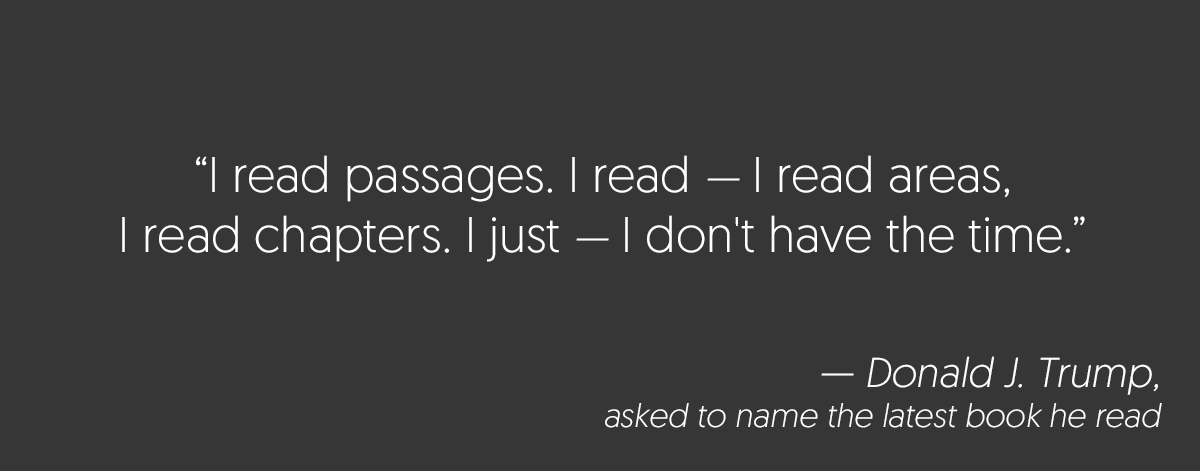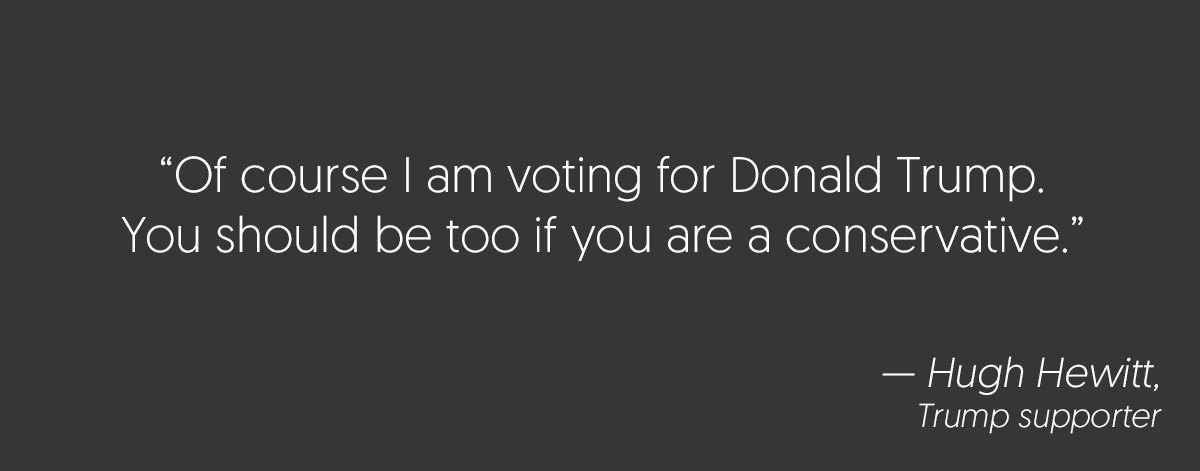
Sarah Wasko / Media Matters
“It is hard work to read widely and broadly, and on both sides of the political aisle,” conservative commentator Hugh Hewitt wrote in a July 2014 explanation of why he had decided to, in his words, “embarrass” a young Huffington Post journalist during an interview on his radio show by quizzing him about what books he had read about the war on terror. “Time consuming. Not very fun actually. But necessary. If you intend to be taken seriously. More importantly, if you intend the country to endure.”
Since then, NBC hired Hewitt as a political analyst, The Washington Post brought him on as a contributing columnist, and MSNBC has now announced that it is handing Hewitt a weekly show airing on Saturday mornings. These media outlets fell for the idea that he is a different type of conservative talker, the “antidote” to “bombastic personalities” like Sean Hannity or Rush Limbaugh. In reality, his actions during the 2016 presidential election campaign and the early months of the Trump administration have showed that he simply puts an intellectual gloss on their same brand of partisan hackery.
In recent weeks, while pundits who share Hewitt's reputation for erudition have castigated the president as dangerously unlearned and incurious, Hewitt has instead stood alongside the president's media sycophants, laying down cover fire for Trump. Hewitt supported Trump's firing of FBI Director James Comey, who was investigating his campaign's connections to the Russian government; he downplayed reports that Trump had revealed highly classified information in a meeting with Russian officials; after numerous outlets reported that Comey had kept notes of a meeting with Trump in which the president suggested he halt an investigation into a Trump aide, Hewitt's focus was on whether Comey, not Trump, had behaved appropriately.
A breakout media star of the campaign, Hewitt garnered numerous glowing profiles stressing his intellectual heft and curiosity: the “necessary bookshelf” of national security tomes he promotes on this website; how he opens interviews by asking his guests if they know who Alger Hiss is and have read Lawrence Wright’s book The Looming Tower*; his friends on all sides of the political debate; his regular interviews of prominent mainstream journalists; his experience in politics, law, and academia; and in particular the way those features make him distinct from other conservative radio and cable news hosts.
But Hewitt set aside his concern for the life of the mind and voted for Donald Trump for president, a man of manifest ignorance and intellectual laziness who is unaware of basic historical facts and legal principles, uninterested in policy nuance or detail. As Hewitt had noted in demolishing a 31-year-old journalist, it is “hard work to read widely,” and Trump never bothered to try -- it seems plausible he has read fewer books as an adult than he is credited with writing. Asked to name the last book he had read in an interview last May, Trump commented, “I read passages. I read -- I read areas, I read chapters. I just -- I don't have the time."
For Hewitt, reading widely was necessary to credibly comment on foreign policy, but not to make it.
Hewitt, who remained neutral during the Republican presidential primary, frequently provided Trump with friendly access to his audience; he was “the very best interview in America,” according to the host. In none of those interviews with a man who was seeking to be the potential next leader of the free world was Hewitt nearly as aggressive as he had been in his interview with a young Huffington Post reporter.**

In their first interview, in February 2015, Trump acknowledged that he hadn’t read The Looming Tower, couldn’t name any works of fiction that he’d read, and admitted that he could not speak about nuclear submarines in any real detail (“I just know this. Military is very important to me.”). None of this seemed to strike Hewitt as a problem.
Hewitt could perhaps be forgiven for not going after Trump with guns blazing at that time, before Trump had announced he was running for president, when many commentators thought that his potential run was a joke. But as the months passed and Trump became and remained the Republican front-runner, Hewitt never pivoted to consistently scrutinizing Trump’s intellectual stature.
Hewitt drew attention and praise for their seventh interview in September 2015. Saying that he was finally going to give the Republican front-runner “commander in chief questions,” the radio host quizzed Trump about major terrorist leaders and international events. “I’m looking for the next commander-in-chief, to know who Hassan Nasrallah is, and Zawahiri, and al-Julani, and al-Baghdadi. Do you know the players without a scorecard, yet, Donald Trump?” Hewitt asks at one point. “No, you know, I’ll tell you honestly, I think by the time we get to office, they’ll all be changed. They’ll be all gone,” Trump replied.
Commentators praised Hewitt for having “stumped” and “tripped up” Trump. Hewitt himself takes issue with those characterizations, and indeed, if you review the interview transcript, you’ll find Hewitt repeatedly bringing Trump back from the ledge that the candidate’s ignorance put him on.
Hewitt let Trump get away with saying it was appropriate for him not to learn about foreign policy issues until he’s elected and claiming that he wasn’t willing to talk about hypotheticals because he didn’t “want the other side to know” what he would do. At one point Trump openly rejected the entire premise of Hewitt’s purported worldview, saying that because he’s a “delegator” who hires “great people” it’s “ridiculous” to ask him specific questions about prominent figures and world events.
Following the interview, as pundits criticized Trump for his performance, the candidate lashed out at Hewitt as a “third-rate radio announcer.” After initially defending his own performance, Hewitt said that it was his fault that Trump had “misunderstood” his question.
Trump's criticism got results, as the host adjusted his interview style to get back on Trump’s good side. Hewitt interviewed Trump eight more times over the course of the presidential campaign. He never again asked Trump a question intended to demonstrate whether the candidate had specific knowledge, instead focusing on open-ended foreign policy hypotheticals, process questions, and softballs about Clinton’s alleged misdeeds.

In the end, the erudite Hewitt, who cast aspersions at a reporter for commenting on foreign policy without first reading the right books, ended up supporting Trump just as Limbaugh and Hannity did, and for much the same reasons. In the end, Hewitt was a partisan, towing the Republican line and supporting the party’s nominee in spite of Trump’s manifest ignorance.
“Of course I am voting for Donald Trump. You should be too if you are a conservative,” Hewitt wrote in July. His case was a raw appeal to the need to ensure that Republicans gained access to the levers of power. Conservative dominance of the U.S. Supreme Court outweighed all other factors, according to Hewitt; his other arguments included the claim that “Hillary Clinton is thoroughly compromised by the Russians,” that Trump will appoint conservatives to positions of power, and that he definitely really “isn’t a racist, or a dangerous demagogue, a Mussolini-in-waiting, a Caesar off-stage.”
When Hewitt did speak out against Trump -- at times even calling for the Republican National Committee to take action to prevent him from being nominated and urging the nominee to drop out -- his argument was again partisan: that Trump should be replaced because he could not win. Trump was on the ticket on Election Day, and so Hewitt voted for him.
This sort of naked partisanship -- the belief that one’s party is better for the country than the alternative, and thus should be supported as long as its candidate can meet some bare minimum standard (“isn’t a racist, or a dangerous demagogue”) -- is a defensible position. But it’s certainly not the position one would expect from someone with Hewitt’s exalted reputation, especially with that bare minimum very much in question.
Trump’s rise was a revelatory moment that separated out the conservative commentators who had a political principle beyond ensuring the Republican Party gained power from those who did not. Several of Hewitt’s colleagues who are similarly regarded as intellectuals distinguished themselves by condemning Trump, saying that they could not in good conscience support someone with his history of ignorance, bigotry, vulgarity, and demagoguery. Hewitt failed this test, in a manner that clashes with the story Hewitt tells about himself, and the one that others tell about him.

Since Trump clinched the Republican nomination, some in the conservative press have blamed right-wing commentators like Limbaugh and Hannity for being willing to set aside principles and carry water for the candidate. But that behavior was completely in character for the right-wing talk radio hosts, who have long served as standard bearers of the Republican Party.
While his megaphone is much smaller than those of Limbaugh and Hannity, Hewitt presents a bigger problem for the conservative movement. He was one of the few with a reputation as an intellectual force who was willing to sacrifice his principles to back the GOP nominee -- and was rewarded with new posts at The Washington Post and MSNBC as an in-house Trump supporter.
Like other pro-Trump pundits, Hewitt is regularly called upon to defend the indefensible, and he frequently rises to the challenge. His recent missives at the Post include columns headlined “It's time to relax about Trump,” “Stop the Trump hysteria,” and “Trump’s first 100 days give conservatives a lot to celebrate.”
But unlike the Jeffrey Lords and Kayleigh McEnanys, and perhaps because of his strong relationships with mainstream journalists and pundits, Hewitt has largely managed to keep his reputation intact. He doesn’t deserve to.
“I would not go through life ignorant of key facts, especially important facts. So many of the people writing under bylines are willing to do just the opposite today,” Hewitt concluded in his essay about why he embarrasses journalists. “It cannot end well when a free people are choosing leaders based upon the reporting of a class of people both biased and blind as well as wholly unaware of both or if aware, unwilling to work at getting smart enough to do their jobs well.”
Fair enough. But surely it also “cannot end well” when the leaders we choose are also “unwilling to work at getting smart.” That is, perhaps, a key fact of which Hewitt remains ignorant.
Hewitt got his Supreme Court justice. All it cost him was his dignity.
Shelby Jamerson provided additional research. Images by Sarah Wasko.
*Hewitt says he asks about Hiss “because the answer provides a baseline as to the journalist’s grasp of both modern American political history and to a crucial fault-line through it,” and about The Looming Tower because “It is almost journalistic malpractice to opine on any aspect of the West’s conflict with Islamist radicalism without having read Wright’s work, which won the Pulitzer Prize and which is the standard text.” For the record, the author knows who Hiss is, believes the evidentiary record supports the conclusion that he was a Soviet spy, and has read The Looming Tower.
** Hewitt has interviewed Trump 15 times during the campaign, for the following editions of his radio show: February 25, 2015; June 22, 2015; August 3, 2015; August 12, 2015; August 26, 2015; August 29, 2015; September 3, 2015; September 21, 2015; October 22, 2015; November 5, 2015; December 1, 2015; February 4, 2016; February 22, 2016; June 23, 2016; and August 11, 2016.